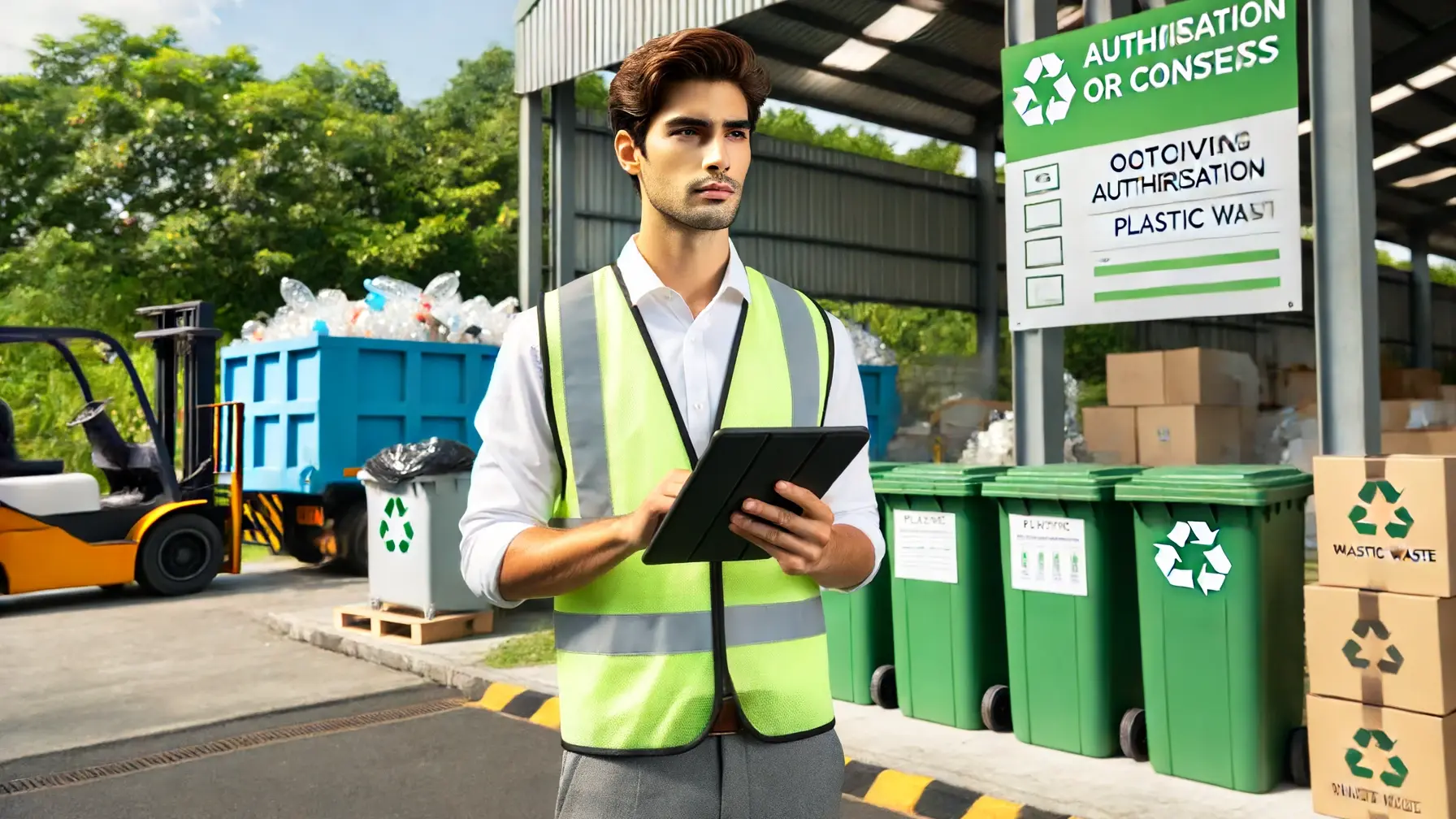Overview
Obtaining an Authorization/Consent under Plastic Waste Management Rules is essential for businesses and industries involved in the production, import, sale, distribution, and recycling of plastic products in India. This authorization ensures compliance with the Plastic Waste Management Rules, 2016, which aim to mitigate the environmental impact of plastic waste. By adhering to these regulations, businesses contribute to sustainable waste management practices, reducing plastic pollution and protecting the environment.
The significance of obtaining this authorization cannot be overstated. Plastic pollution is a critical environmental issue globally, and India is taking proactive steps to address it. The Plastic Waste Management Rules, 2016, provide a comprehensive framework for managing plastic waste, emphasizing the responsibilities of producers, importers, brand owners, and waste management entities. This framework includes measures for reducing plastic waste generation, promoting the use of recycled plastics, and ensuring the safe disposal of plastic waste.
Businesses that obtain authorization under these rules demonstrate their commitment to environmental sustainability. This commitment not only helps in reducing the ecological footprint but also enhances the company's reputation and stakeholder trust. Moreover, compliance with these rules is legally mandated, and failure to obtain the necessary authorization can result in severe penalties, including fines and operational shutdowns.
In this guide, we will provide detailed information on the process of obtaining authorization under the Plastic Waste Management Rules, including the approval process, applicability, legal provisions, where to obtain the authorization, procedure, documents required, fees, authority, application mode, time limit, and frequently asked questions.
About Approval
The approval process for obtaining authorization under the Plastic Waste Management Rules involves several steps to ensure compliance with the environmental regulations. The authorization is granted by the State Pollution Control Boards (SPCBs) or the Pollution Control Committees (PCCs) for Union Territories.
The primary objective of the approval process is to evaluate whether the applicant complies with the prescribed standards for plastic waste management. This involves assessing the applicant's waste management plan, recycling methods, and measures for reducing plastic waste generation.
To initiate the approval process, the applicant must submit a detailed application form, which includes information about the type and quantity of plastic products handled, the waste management plan, and the recycling processes employed. The SPCB or PCC reviews the application and may request additional information or clarification.
An on-site inspection is often part of the approval process. During this inspection, officials from the pollution control board visit the facility to verify the information provided in the application and assess the effectiveness of the waste management practices. This ensures that the applicant adheres to the environmental standards set forth in the Plastic Waste Management Rules.
Upon satisfactory review and inspection, the pollution control board grants the authorization. This authorization is typically valid for a specified period and must be renewed periodically. Compliance with the conditions outlined in the authorization is mandatory throughout its validity period.
Applicability
The Plastic Waste Management Rules apply to a wide range of stakeholders involved in the lifecycle of plastic products. The applicability includes:
- Producers: Entities involved in the manufacturing of plastic products.
- Importers: Companies that import plastic products into India.
- Brand Owners: Businesses that sell products under their brand name, which includes plastic packaging.
- Distributors: Entities responsible for distributing plastic products to retailers.
- Retailers: Businesses that sell plastic products directly to consumers.
- Waste Processors: Facilities engaged in the recycling and disposal of plastic waste.
These rules are designed to ensure that all stakeholders in the plastic product lifecycle are accountable for the environmental impact of plastic waste and contribute to its effective management.
Legal Provisions
The legal provisions governing the Authorization/Consent under the Plastic Waste Management Rules are extensive. Key legal provisions include:
- Plastic Waste Management Rules, 2016: Establishes the framework for plastic waste management in India.
- Environment (Protection) Act, 1986: Provides the overarching framework for environmental protection, including waste management.
- Extended Producer Responsibility (EPR): Mandates producers, importers, and brand owners to take responsibility for the collection and recycling of plastic waste.
- Recycling Standards: Prescribes standards for the recycling of plastic waste to ensure environmental safety.
- Ban on Certain Plastics: Imposes bans on specific plastic products, such as single-use plastics, to reduce plastic waste generation.
- Compliance Monitoring: Requires periodic reporting and compliance checks by the SPCB/PCC to ensure adherence to the rules.
- Penalties for Non-Compliance: Details penalties for failing to comply with the Plastic Waste Management Rules, including fines and operational restrictions.
Where to Obtain
Authorization under the Plastic Waste Management Rules can be obtained from the respective State Pollution Control Boards (SPCBs) or Pollution Control Committees (PCCs) for Union Territories. The steps to obtain this authorization are as follows:
- Identify the Relevant Authority: Each state and Union Territory has its pollution control board or committee.
- Visit the Official Website: Access the official website of the respective SPCB or PCC.
- Download the Application Forms: Forms are usually available in the 'Downloads' or 'Forms' section of the website.
- Submit the Application: Applications can be submitted online or offline, depending on the provisions of the respective pollution control board.
Procedure
The procedure for obtaining Authorization/Consent under the Plastic Waste Management Rules involves the following steps:
1. Prepare the Application:
- Gather necessary information about the type and quantity of plastic products handled.
- Prepare a comprehensive waste management plan outlining the measures for reducing plastic waste generation and promoting recycling.
2. Submit the Application:
- Visit the official website of the relevant State Pollution Control Board (SPCB) or Pollution Control Committee (PCC).
- Download the appropriate application form and fill it out with accurate details.
- Attach all required documents, including the waste management plan, recycling methods, and details of plastic products handled.
3. Pay the Application Fee:
- Pay the prescribed application fee online or through a bank draft, as specified by the SPCB or PCC.
4. Site Inspection:
- Once the application is submitted, the SPCB or PCC may schedule an on-site inspection to verify the details provided in the application.
- Ensure that all waste management measures are in place and functioning as described in the application.
5. Review and Approval:
- The SPCB or PCC reviews the application and inspection report.
- If additional information or clarification is required, respond promptly to avoid delays.
6. Grant of Authorization:
- Upon satisfactory review, the SPCB or PCC grants the authorization.
- The authorization document will specify the conditions that must be adhered to during the operation of the business.
7. Renewal:
- The authorization is typically valid for a specified period and must be renewed before its expiry.
- Submit the renewal application with updated information and compliance reports.
Documents Required
When applying for Authorization/Consent under the Plastic Waste Management Rules, the following documents are generally required:
- Application Form: Duly filled and signed application form.
- Waste Management Plan: Detailed plan for managing plastic waste, including recycling methods.
- Details of Plastic Products: Information about the type and quantity of plastic products handled.
- Consent Fees: Proof of payment of the application fee.
- Previous Consent Orders: Copies of previous consents, if any.
- Compliance Reports: Previous compliance reports, if applicable.
- Company Registration: Certificate of incorporation or registration of the company.
- Affidavit: Affidavit stating compliance with environmental laws.
Fees
The fee for obtaining Authorization/Consent under the Plastic Waste Management Rules varies depending on the type and scale of the business. It is determined by the respective State Pollution Control Board (SPCB) or Pollution Control Committee (PCC) and is typically based on the following factors:
- Business Category: Fees may vary for different categories of businesses, such as producers, importers, brand owners, and waste processors.
- Plastic Product Quantity: Higher quantities of plastic products may attract higher fees.
- Location: Fees may differ for businesses located in different regions.
Authority
The authority responsible for granting Authorization/Consent under the Plastic Waste Management Rules is the State Pollution Control Board (SPCB) or the Pollution Control Committee (PCC) of the respective state or Union Territory. These bodies operate under the Ministry of Environment, Forest and Climate Change (MoEFCC) and are responsible for enforcing environmental regulations and standards.
Application Mode
The application for Authorization/Consent under the Plastic Waste Management Rules can be submitted either online or offline, depending on the provisions of the respective State Pollution Control Board (SPCB) or Pollution Control Committee (PCC). Most SPCBs and PCCs have online portals where applications can be submitted electronically for convenience and efficiency.
Time Limit
The time limit for obtaining Authorization/Consent under the Plastic Waste Management Rules typically ranges from 30 to 90 days, depending on the complexity of the application and the efficiency of the respective State Pollution Control Board (SPCB) or Pollution Control Committee (PCC).
FAQs
It is a mandatory environmental license for businesses involved in
the production, import, sale, distribution, and recycling of plastic
products to ensure compliance with the Plastic Waste Management Rules,
2016 and it's latest amendments.
Producers, importers, brand owners, distributors, retailers, and
waste processors handling plastic products are required to obtain this
authorization.
The validity of the authorization varies but is typically between
one to five years, depending on the business category and state
regulations.
Key documents include the application form, waste management plan,
details of plastic products, consent fees, previous consent orders,
compliance reports, company registration, and an affidavit.
The fee varies based on business category, plastic product
quantity, and location, as determined by the respective State Pollution
Control Board (SPCB) or Pollution Control Committee (PCC).
Applications can be submitted online through the respective SPCB
or PCC portal or offline by visiting their office.
The process usually takes between 30 to 90 days, depending on the
complexity of the application and the efficiency of the review process.
Yes, an on-site inspection is typically conducted to verify the
information provided in the application and assess compliance with
environmental standards.
Yes, the consent must be renewed before its expiry by submitting a
renewal application with updated information and compliance reports.
Violations can result in penalties, including fines, suspension of operations, and legal action by the pollution control board.

